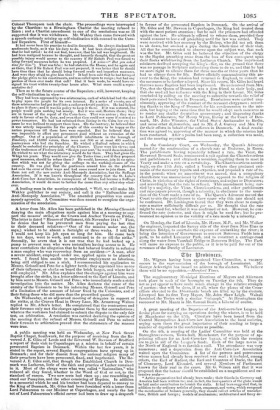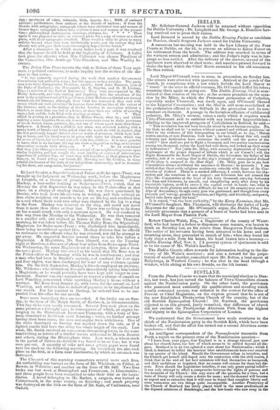'be Vrobinces.
Mr. Wigram having been appointed Vice-Chancellor, a vacancy occurs in the representation of the borough of Leominster. Mr. George Arkwright has issued an address to the electors. We believe there wilt be no opposition.—Hereford Times.
The supplementary Municipal Elections of Mayors and Aldermen took place in each of the boroughs on Tuesday the 9th. They do not as yet appear to have made much change in the relative strength of parties : that will be done, if at all, when the places of the Coun- cillors elevated to the Aldermanic bench are filled up by the electors. Liverpool has its first Tory Mayor, Mr. John Shaw Leigh. Walsall. furnished the Tories with a similar " triumph." At Birmingham the successor to Mr. Muntz is Mr. Samuel Beale, a Liberal of course.
A great meeting of the Deputies of the Anti-corn-law League, to devise plans for carrying on operations during the winter, is to be held. at Manchester on the 17th. Circulars have been issued from the Central Metropolitan Anti-Corn-law Association to the local societies, urging upon them the great importance of their sending as large a number of deputies to the conference as possible.
On the 4th, a meeting of the Ladies' Committee was held at the Boroughreeve-room, Town-hall, Manchester, for the purpose of ap- pointing officers for an Anti-Corn-law bazaar, of which the receipts are to go in aid of the League's funds. Each of the large towns in the North of England is to furnish a stall. '['he attendance was very numerous ; and a deputation from the Anti-Corn-law Association waited upon the Committee. A list of the patrons and patronesses whose names had already been received was read : it included, among others, the Earl of Radnor, the Earl and Countess of Duck, the Earl of Cloncarry, Lord Kinnaird, and several Members of Parliament known for their zeal in the cause. Mr. G. Wilson said that it was proposed that the bazaar should be established on a magnificent and ex- tensive scale- " Active preparations had already been made; their friends in Germany and America bad been written to ; and. in fact, the four quarters of the globe would be laid under contribution to furnish the stalls. It had been suggested that, in addition to the ordinary articles of dress, ornament, and vertu, which composed the merchandise of bazaars generally, they should collect articles of manufac- ture, British and foreign; models of mechanism; architectural and fancy de- sign ; specimens of coins, minerals, birds, insects, Stc. ; MSS. of eminent authors ; publications, from authors or the friends of authors; if from the friends, with autographs; autograph letters from celebrated men and women of former days; autograph letters from celebrated men and women of the present time; philosophical instruments, drawings, pictures, &c. • • • • Then again it was proposed to write to eminent poets for a copy of verses or a short poem, with their autographs attached. Thus would a value be given to many articles beyond what they were intrinsically worth, and the success they had already met with gave them most encouraging hopes for the future." After a discussion in which many ladies took a part, it was resolved that the bazaar should be held at the beginning of February. A ballot took place for officers ; when Mrs. Callender was chosen President of the Committee, Mrs. Armitage Vice-President, and Mrs. Woolley Se- cretary.
The Bolton Free Press reports the visit to Bolton of three Tory aspi- rants to political eminence, to make inquiry into the stories of the dis- tress in that town-
" It was currently reported during the week that another Government Commission had arrived in town ; but this appears to be a mistake. The party seen were three Conservative Members, namely, Lord John Manners, (son of the Duke of Rutland,) the Honourable G. S. Smythe, and H. H. Lindsay, Esq.; (a relative of the Earl of Balcarres.) They were accompanied by Mr. Henry Ashworth, and were visiting and inquiring into the condition of the poor in the neighbourhood of Chapel Street, Little Bolton—a district not deemed remarkable for distress; although, from what has transpired, they met with scenes which are well calculatedlo impress them with an idea of the extent of the distress; such as the finding of twelve families in succession without a blanket, or more than one bed in a house, or more than one article of covering upon a bed, and the beds filled with shavings or straw. * * • They called in passing at a provision-shop in Hulme Street, close by; and whilst making a some inquiries there, six or seven customers came to make purchases of bread, butter, bacon, potatoes, &c., not one of whom spent more than three- halfpence. A female, with a child in her arms, was observed retiring with a pennyworth of bread; and being asked what she would do with it, replied, that she had previously bought three-halfpence worth of potatoes, which were boil- ing at home, and the bread was to be eaten with them for dinner, which was for seven of them, her husband and self, with five children. It is most grateful to learn, that in no instance did any one show a disposition to beg, or to attract observation towards their distresses. • * • As we understand that they [the three gentlemen] visited several of our neighbouring towns upon similar inquiries, and had sought the most intelligent sources of information, regardless of political bias, we trust they will hereafter, iu their places in Par- liament, be found aiding our friends Dr. Bowring and Mr. Cobden, in these painful disclosures of the state of our industrious community, and in demand- ing for them, not compassion, but justice."
Richard Stonier, a Superintendent of Police at Stoke-upon-Trent, was brought up for judgment on Wednesday week, before the Magistrates at Longton, on a charge of grossly maltreating a prisoner. James Mackay, a beer-seller residing at Stoke-upon-Trent, stated, that on Monday the 27th September he was taken to the Police-office at that place, on a charge of stealing timber. He was there questioned by Stonier, who took down his answers in writing, and then ordered an iron chain weighing six pounds to be put on his leg, and confined him in a cell where there were two other men chained by the leg to a ring in the floor. Mackay was fastened to the ring, and could not move from it more than three or four feet. There was nothing to lie down on but a small couch with only a mattress upon it. He was confined in this way from the Monday to the Wednesday. He was then removed to a smaller cell, and chained as before to the floor. On Thursday morning, he was taken before Mr. Thomas Bailey Rose, the Stipendiary Magistrate for Stoke-upon-Trent ; who discharged him immediately, there being no evidence against him. Mackay declares that he offered no resistance to the officers when he was arrested, nor did he attempt to get away. He requested Stonier several times to take him before a Magistrate. A Magistrate, Mr. Rose himself, was on the Tuesday night at Burslem, a distance of about four miles from Stoke-upon-Trent. On Wednesday, the same Magistrate sat at Longton, three miles from the same place. Mackay also stated as his belief, that Mr. Rose was at the Police-office on Wednesday while he was in confinement ; and that a man who had been in Stonier's custody, and confined for four days and four nights, was then discharged for want of any evidence against him. On the 30th September, Mackay's friends employed an attorney, Mr. Williams ; who insisted on Stonier's immediately taking him before a Magistrate, or he would probably have been kept still longer in con- finement. Stonier was also summoned to answer a charge of assault on Levi Wending, committed while searching Mackay's house without a warrant. Mr. Rose fined Stonier -11., with costs, for the assault on Levi Wending, and ordered him in default of payment to be imprisoned for one month. For his conduct to Mackay, he ordered him to be sus- pended from his office for one month.
Some more incendiary fires are recorded. A fire broke out on Sun- day, in the farm of Mr. Ralph Smith, of Radbrook, in Gloucestershire. Two hay-ricks were nearly consumed. Several fires took place on the same premises a fortnight ago ; in consequence of which, an engine be- longing to the Birmingham Insurance Company, with a body of fire- men, remained at Radbrook until Saturday ; when, no further attempt having then been made, the men and engine were withdrawn. One of the ricks destroyed on Sunday was marked down the side, as if a lighted candle had been run along the whole length of the stack. Last week, Mr. Smith received an anonymous threatening letter, in the same handwriting as letters of a similar nature addressed to Messrs. Bourne and others, during the Birmingham riots. Last week, a wheat-stack in the parish of Sutton-in-Ashfield was found to be on fire ; but it was soon put out. A quantity of coke and some greasy paper were found near the stack on the following morning. An incendiary fire also took place on the 30th, at a farm near Eastbourne, by which an oat-stack was destroyed.
The Chronicle of this morning enumerates several more such fires. An outbuilding was burned on the farm of Mr. Wickham, on Friday, at Rowde, in Wiltshire ; and another on the farm of Mr. Self. Two fires broke out last week at Hemingford and Fenstanton, in Lincolnshire ; and three people have been committed to take their trial as the incen- diaries. A hovel belonging to Mr. Barber, a surgeon, was burned at Colsterworth, in the same county, on Saturday ; and much property was destroyed on the 10th on the farm of Mr. Gale, of Cuddesden, near Oxford.



























 Previous page
Previous page